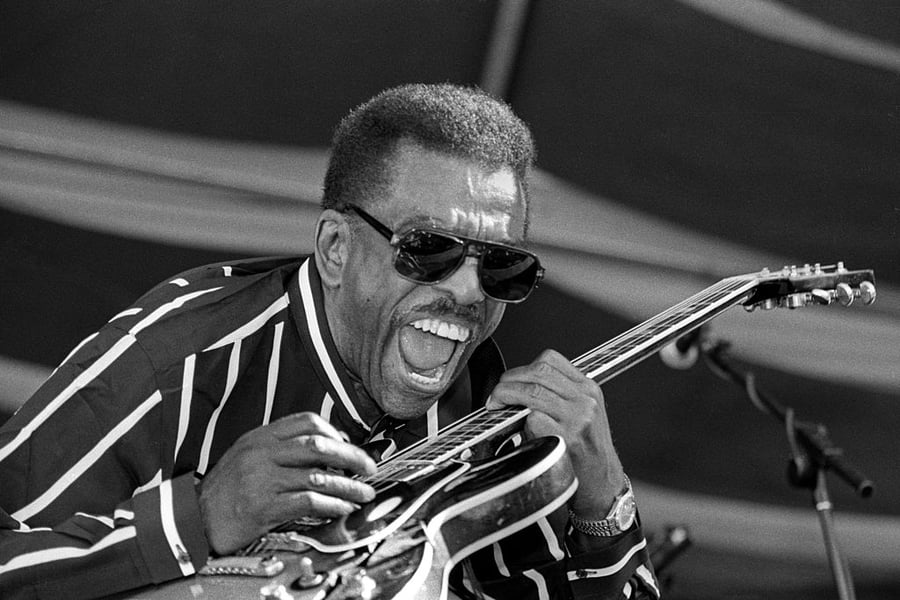Syl Johnson, the Chicago soul singer and blues artist whose 1967 track “Different Strokes” became one of most sampled songs in hip-hop history, has died at the age of 85.
Johnson’s family announced his death Sunday; no cause of death was provided. The singer’s death comes just days after his older brother, Blues Hall of Fame inductee Jimmy Johnson, died at the age of 93, CBS Chicago reports.
“It is with extreme sadness that our family announces the passing of Soul & Blues Hall of Fame Legend, Syl Johnson (born Sylvester Thompson in Holly Springs, MS). Dad, Brother, Grandfather, Great Grandfather, Uncle, Friend & Artist, he lived his life as a singer, musician, and entrepreneur who loved black music,” the family said in a statement.
“A fiery, fierce, fighter, always standing for the pursuit of justice as it related to his music and sound, he will truly be missed by all who crossed his path. His catalog and legacy will be remembered as impeccable and a historical blueprint to all who experience it.”
The Mississippi-born Johnson was the marquee act on the Chicago label Twilight/Twinight in the Sixties, enjoying moderate success during his career with singles like “Come On Sock It to Me” and “Is It Because I’m Black.” After moving to Willie Mitchell’s Memphis-based Hi Records in the Seventies, Johnson had his biggest hit as a singer with his 1975 cover of “Take Me to the River.”
However, his most lasting impact on music would come in the form of his 1967 song “Different Strokes,” a portion of which ended up on the fourth volume of the pioneering sampling compilation Ultimate Breaks and Beats.
Elements from “Different Strokes” would later be heard in Public Enemy’s “Fight the Power” and “Fear of a Black Planet,” Kanye West and Jay-Z’s Watch the Throne bonus track “The Joy,” the Wu-Tang Clan’s “Shame on a Nigga,” Boogie Down Productions’ “Criminal Minded,” Kool G Rap and Polo G’s “Talk Like Sex,” songs by Tupac Shakur, N.W.A, the D.O.C., Das EFX and countless more rappers.
However, Johnson — despite being self-proclaimed as “the most sampled artist ever” — rarely saw royalties from his song being sampled, leading to a notable $29 million lawsuit against Cypress Hill and as well as another lawsuit against West and Jay-Z, who ultimately settled their lawsuit with Johnson in 2012. Johnson would eventually regain control of the song’s royalties, resulting in an influx of money decades after he largely stopped recording. “I’m sitting in the house that Wu-Tang built with their money,” Johnson quipped to the New York Times in 2010. (That house also had platinum and gold plaques adorning the walls, sent to Johnson from many of the rappers who sampled “Different Strokes,” the Chicago Reader reported.)
Archival record label Numero Group, which released the first retrospective of Johnson’s work, tweeted Sunday, “If any single artist could be considered a mascot for Numero, Mississippi-born soul man Syl Johnson was it. He was the first major artist to give our humble Southside Chicago operation a shot—even if he did threaten to sue us in that first conversation.” The label added a quote from Johnson, “I made my opportunities, but I never got the breaks I should have gotten. I was a jack-of-all-trades. More soul than Marvin, more funk than James. If I’d gone pop, you’d be talkin’ about me, not them. I rate right at the top, though I’ve been underrated all my life.”
Johnson told the New York Times in 2010, when the Numero anthology was released, “Back in the day I didn’t get the proper chance, like a lot of people; I didn’t get the chance that I’m getting now. But I didn’t drop out of my dreams, and now these people went back and picked it up and said, ‘This is gold right here, man, you missed the gold.’ And I think that once you check it out, you’ll like it.”
From Rolling Stone US






































